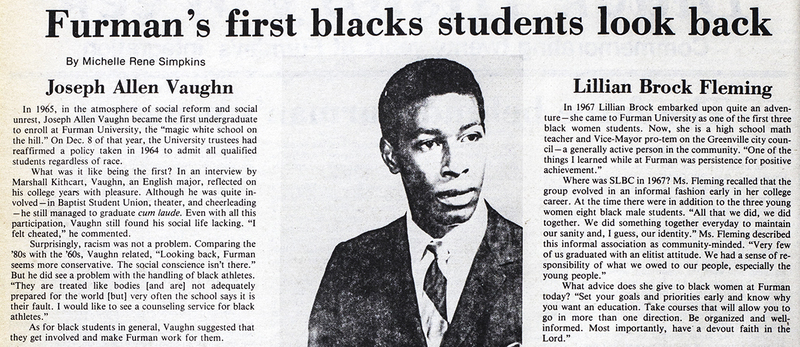Browse the Collection
Browsing 1 item in our archive
Filters: Furman's first blacks students look back -- By Michelle Rene Simpkins -- Joseph Allen Vaughn -- In 1965, in the atmosphere of social reform and social unrest, Joseph Allen Vaughn became the first undergraduate to enroll at Furman University, the "magic white school on the hill." On Dec. 8 of that year, the University trustees had reaffirmed a policy taken in 1964 to admit all qualified students regardless of race. What was it like being the first? In an interview by Marshall Kithcart, Vaughn, an English major, reflected on his college years with pleasure. Although he was quite involved-in Baptist Student Union, theater, and cheerleading --he still managed to graduate cum laude. Even with all this participation, Vaughn still found his social life lacking. "I felt cheated," he commented. Surprisingly, racism was not a problem. Comparing the '80s with the '60s, Vaughn related, "Looking back, Furman seems more conservative. The social conscience isn't there." But he did see a problem with the handling of black athletes. "They are treated like bodies [and are] not adequately prepared for the world [but] very often the school says it is their fault. I would like to see a counseling service for black athletes." As for black students in general, Vaughn suggested that they get involved and make Furman work for them. Lillian Brock Fleming [sic] In 1967 Lillian Brock embarked upon quite an adventure -- she came to Furman University as one of the first three black women students. Now, she is a high school math teacher and Vice-Mayor pro-tem on the Greenville city council--a generally active person in the community. "One of the things I learned while at Furman was persistence for positive achievement." Where was SLBC in 1967? Ms. Fleming [sic] recalled that the group evolved in an informal fashion early in her college career. At the time there were in addition to the three young women eight black male students. "All that we did, we did together. We did something together everyday to maintain our sanity and, I guess, our identity." Ms. Fleming [sic] described this informal association as community-minded. "Very few of us graduated with an elitist attitude. We had a sense of responsibility of what we owed to our people, especially the young people." What advice does she give to black women at Furman today? "Set your goals and priorities early and know why you want an education. Take courses that will allow you to go in more than one direction. Be organized and well-informed. Most importantly, have a devout faith in the Lord." Clear filters

